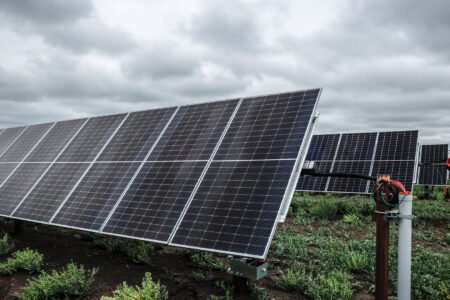
As we grapple with the many difficulties and tragedies of the COVID-19 pandemic, it’s difficult to think of much else. But, collectively, we must realize that once we get through this pandemic – and we will get through it – we will face a dual challenge: a shattered economy and an environmental crisis. We will have no choice but to confront both simultaneously.
To support people experiencing the worst effects of the pandemic – those losing loved ones and livelihoods, and those living in poverty – the federal government’s immediate priorities must be to limit the spread of the virus and strengthen critical health care systems, while also providing emergency assistance to workers and businesses. At the same time, to prepare for the longer term, we must remember that once the pandemic is under control and economic recovery is under way, we will continue to face the existential challenges of the climate crisis and mass biodiversity loss. These literally put our future as a species into question.
While many sectors require assistance, recovery funds made available in response to this economic crisis, if allocated appropriately, can help ensure future capacity in clean and renewable technologies, allowing us to rebuild better and leaving businesses and communities more economically, environmentally and socially resilient.
Recovery funding to support Canadian businesses must also be aligned with Canada’s climate objectives. It must help create a sustainable future, because our current path is not leading us there. Now is not the time to prop up unsustainable practices, relax regulatory requirements or promote outdated business models that are incompatible with our internationally agreed-upon climate and biodiversity targets.
The David Suzuki Foundation has developed a series of short- and mid-term recommendations for how Canada might “recover better” from this global pandemic. They are all aligned with the federal government’s climate plan and existing programs, and they focus on six areas: energy efficiency, clean energy, public transit, natural infrastructure, decontamination and methane reduction.
Energy and public transit
A number of proposed actions — from supporting retrofits, energy efficiency and community renewable energy production to retraining workers in the energy sector, accelerating electrification and further investing in public transit infrastructure — would position Canada well to exceed current 2030 emissions targets. Here’s what the federal government should do:
- Initiate cost-shared deep retrofits of public, commercial and residential buildings. These projects would create jobs immediately and lower the risk to private sector capital at a time of reduced confidence, while also highlighting the opportunity to invest in energy efficiency as a means of achieving economic recovery.
- Help the 2.8 million households in Canada struggling to pay their energy bills by topping up funding for existing energy-efficiency programs directed at low-income families, at no cost to participants.
- Accelerate Canada Infrastructure Bank’s investments in community renewable energy production, green energy deployment, electrical grid expansion and interconnection projects to create immediate employment opportunities for skilled workers, such as electricians and builders, in their own communities.
- Accelerate initiatives already under way to electrify the transportation sector. Not only does electrification improve energy efficiency, it also helps zero out carbon pollution and takes advantage of the country’s largely clean electricity grid. Boosting these programs would involve scaling up investments (beyond the committed $130 million over five years) and front-end loading efforts to build out charging infrastructure for electric vehicles, with a focus on multi-unit residential buildings and direct-current fast-charging devices.
- Inject immediate transition funds into Infrastructure Canada’s public transit infrastructure fund, to accelerate the construction of approved and proposed transit projects, because transportation remains one of the highest-polluting sectors of the economy.
- Provide funding to stabilize transit systems and compensate for revenue losses and extra expenses incurred during the COVID-19 pandemic to ensure planned capital expenditures on system expansion and electrification are not deferred.
Protecting nature
At the same time, investing in restoration of natural assets, large-scale deployment of phytotechnology (plant-based approaches), decontamination of orphaned oil and gas wells and methane reduction efforts would help put Canada on track to meet 2030 biodiversity goals while creating jobs.
Numerous examples demonstrate that ecosystem-restoration projects provide meaningful economic contributions to local economies, and to broader regional and national economies. Meanwhile, phytotechnology is an essential part of climate adaptation in major cities and has the potential to create job opportunities in a growing sector, while enhancing resilience and improving key environmental indicators like flood risk and air quality.
Indigenous communities must also be supported to play a leadership role in conservation and restoration efforts. We encourage the federal government to focus its support on areas that are not the responsibility of an identifiable company – like regulatory and policy requirements for post-operation site remediation – but also to fund Indigenous leadership and local employment in science-based ecological restoration.
The opportunity is now
As the International Energy Agency has observed, the recent precipitous drop in oil prices creates another opportunity. Rather than expanding fossil fuel subsidies in a costly attempt to protect businesses and jobs that depend on an outdated business model and on high international oil prices that are unlikely to return, it is time to complete the phase-out of fossil fuel subsidies and invest vigorously in clean energy, energy efficiency, electrification, biofuels, decommissioning and clean up of orphaned wells and mine sites and retraining workers.
History shows us that Canada has long experience in assisting industry in times of severe financial trouble. We can learn from past successes. Many environmentally beneficial projects that align with the federal government’s current direction are ready to go; those that are not, could be expanded throughout the country.
But when ramping up, we must avoid repeating past mistakes. The auto industry bailout in 2008-09 was costly for Canadian taxpayers, and did little to secure long-term, well-paying jobs or position the industry for longer-term challenges.
A more successful model is the Pulp and Paper Green Transformation Program, which ran from 2008 to 2012. It addressed the public interest and improved the pulp and paper industry’s viability by supporting quantifiable environmental and energy improvements and improving the sector’s economic strength in the face of capital financing difficulties and stiff international competition.
These cases show that federal support should be contingent on helping businesses adapt to emerging structural changes and the imperatives of a net-zero-carbon future. We don’t have to choose between recovery and the environment.
COVID-19 is testing our fabric as societies: our ability to come together, support one another and act for the common good. Emerging from it will provide an opportunity to correct our course and create a better future for all life on this planet. Let’s seize it.
This article is part of the The Coronavirus Pandemic: Canada’s Response special feature.
Photo: The C-train speeding into Westbrook station on May 24, 2015 in Calgary, Alberta. Shutterstock/By Jeff Whyte









